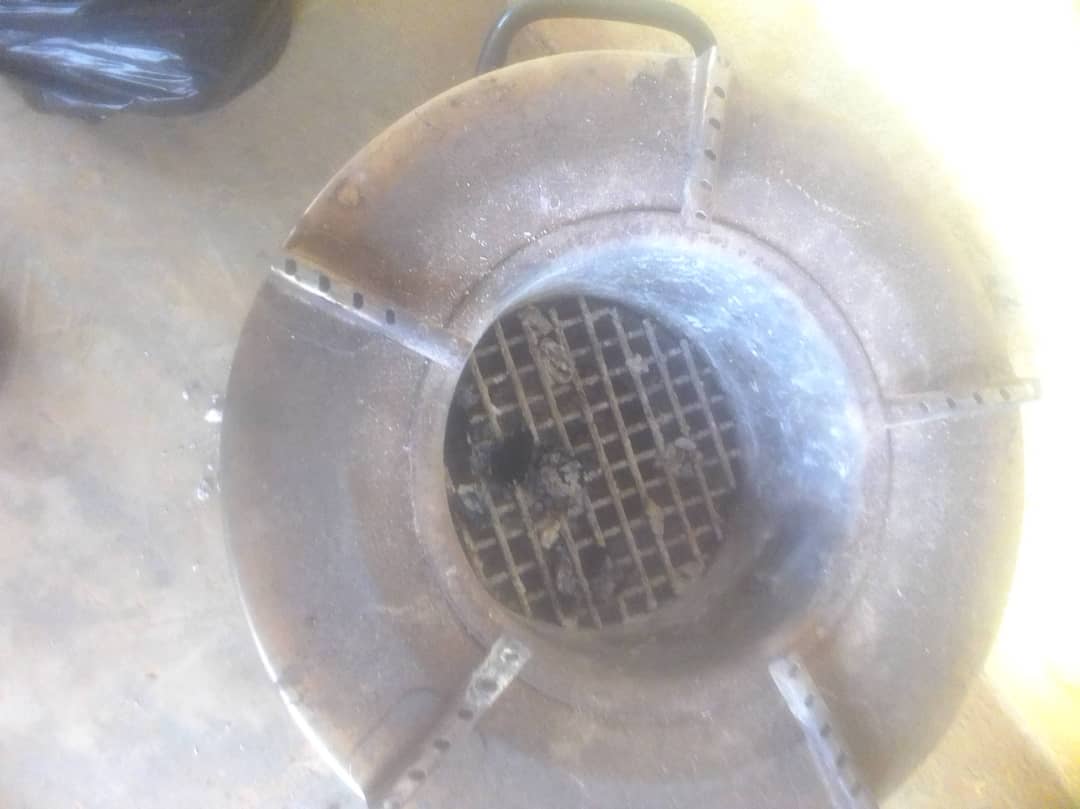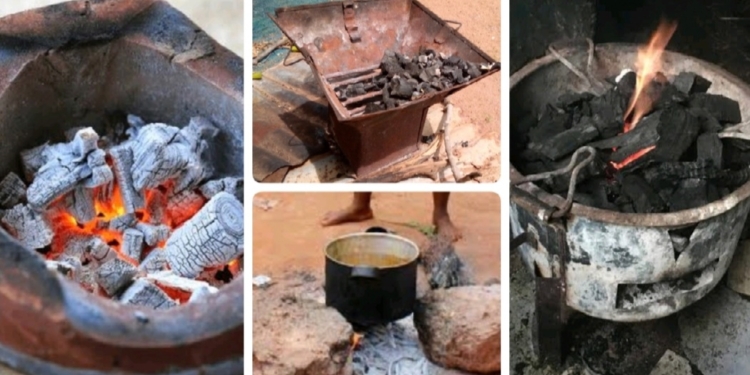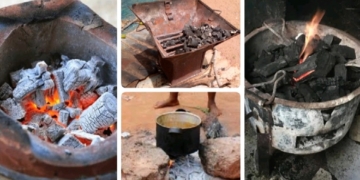Samson, a 19-year-old teenager, was using an axe to chop leftover wood planks that he had collected from a construction site into pieces for his 46-year-old mother, Funmilayo, when this reporter noticed a local stone furnace popularly known as ‘Aaro’ in front of the building.
This reporter noticed that the 19-year-old teenager’s mother was in route to the building after finishing her errand of fetching water for his younger siblings, as she watched him struggle with planks and an axe.
Please, could you give me a few minutes? this reporter made an inquiry. After giving the reporter a troubled glance, Funmilayo moved over to a sidewalk to drop off a rubber fetcher. She questioned the reporter about why he was interested in seeing her as she walked back to him.
“I’m a journalist, and I have some questions for you,” the reporter said to her. I thought newsmen only interviewed famous people, so I’m shocked you want to interview me, Funmilayo replied, laughing. I hope I’m spared, okay? She inquired.
Can I know what you do for a living? The reporter asked. I am a nursery school teacher at a private school. I also teach lessons too, she responded. A worried Funmilayo asked why this reporter wants to know what she does for a living. I heard you talking to your kids in English, and I saw the eldest using an axe to chop used wood into pieces.

So I decided to ask since we are doing research on the economy, as this reporter explained. After giving the reporter another glance, Funmilayo asked to see his identity card (ID), which the reporter duly produced.
Why do you still use the stone furnace? The journalist made a query. The Tinubu-led administration would be in a better position to respond to the query, Funmilayo jokingly informed this reporter. With a smile, Funmilayo responded that the family had chosen to manage their income by switching to a local stone furnace.
In Ilesa, one kilogram of cooking gas costs N1400. The total cost to fill a 6-kg cylinder is N8400. A 6-kg cylinder would need to be filled twice or three times a month for a household of six. She clarified, “My salary implies that I cannot fill a 6kg cylinder twice. I make N15000 per month as a nursery school teacher.”
My children go to private schools. They will purchase books and other writing materials, as well as pay the school tuition. These products are now extremely expensive. My spouse is employed as a sales representative in a paint factory. We will be deeply in debt if we don’t manage our family’s income. She went on to say, “That’s why you see us using local stone furnace as an alternative.”
Because of the impact of flames on her eyes, Funmilayo claims she had already asked for the pricing of a charcoal stove. However, because charcoal stoves are offered for N30,000 and more, she has not been able to get a loan from a friend.
Because of the flames, I truly dislike the stone furnace. Even though I can’t see properly at night, I’m stuck with it. My kids and spouse would eat. Friends of mine who own charcoal stoves have informed me that they are better than the stone furnace. Both produce flames, but only one is minimal The nursery school teacher said, “I’m still waiting on my friend Mummy Samuel to lend me money so that I can buy a charcoal stove.”
In addition to lamenting the rising cost of cooking gas, Funmilayo also bemoaned the lack of alternatives that would have made life easier for Nigerians, as well as the price of kerosene and unreliable electricity caused by high tariffs.
“One liter of kerosene costs N1303. There isn’t steady electricity if you wish to use a hotplate or an electric stove as a substitute. If illumination is present, the voltage is either low or tariff’s palava. Things worsen when alternatives are unavailable. The cost of food has increased dramatically. A dejected Funmilayo went on, “The money that one is supposed to use in buying cooking gas or kerosene can be used to buy food”.
Adisa, a non-academic employee of the University of Ilesa, informed this reporter that he had no choice but to purchase charcoal stoves for his wife after the price of cooking gas increased from N1000 per kilogram to N1400.
Adisa also begged his wife to take into consideration using the stoves.
We are a five-person family. My spouse and my three children. My oldest child attends Osun State University as a student. Tuition is N215,000 that I pay. My two children attend private schools as well. Inflation has made the situation worse in addition to school costs. My wage is no longer sufficient to meet my necessities. My income has been surpassed by expenses. I live on loans. A public servant argued vehemently that in order to survive the current economic climate, one must be prepared for situations that could be disagreeable.
Adisa, who said that he buys charcoal from a charcoal vendor on his way home, said that he occasionally remains in the kitchen with his wife to assist her in setting the stove on fire so as to prevent her from being overly tired.
My spouse purchases products in bulk and resells them. She trades her wares in the Sabo market. She would get home exhausted and still experience the tension of cooking on a charcoal burner. So occasionally, my kids and I create dishes together. We are in a terribly tough situation, but there is nothing we can do. A varsity staff stated, “We are managing.”
The 36-year-old Labake informed this reporter that a friend first showed her how to use a charcoal stove.
Compared to gas cookers, Labake claims that using a charcoal burner is still more cost-effective even though it is slower and more labor-intensive.
Depending on the type of meals I make, I can use charcoal that costs N1500 for more than two weeks. All it would take is tension for there to be flames that could endanger eyes. Unlike a gas cylinder, which may be used inside the house, I prepare meals extremely early and use the corridor or outside the house to prevent coming into contact with flames, Labake revealed.
The reporter was informed by Labake, a single mother of two, that she was given a charcoal burner by her friend Bolatito, which she used before purchasing a new phone because she was unable to buy one.
The cost of food has increased dramatically. My firm has been significantly impacted by this inflation since I utilize both profits and operating capital to provide food for my children. If nothing changes, I intend to take them to public schools. I’m depressed, angry, sad, and frustrated. I have no idea what my kids would eat tonight as I speak to you. I can’t stand how miserable this economy is making my life. Things are really difficult for me, Labake sobbed as she wiped away her tears.
This reporter approached Labake, comforted her, and gave her some cash. She was strongly persuaded to accept the money after initially refusing it. This writer shook his head and walked out of Labake’s sight, thinking that the tragic story of Labake is similar to stories of many other Nigerians who have been imprisoned financially by the nation’s current economic situation. While some Nigerians are vehemently against using charcoal due to the sharp rise in cooking gas prices, charcoal vendors are pleased with the surge in business they have seen.
When cooking gas costs climbed, Motunde, an Ayeso-based charcoal vendor, informed this reporter, her business has flourished.
A sack of charcoal currently costs between N6500 and N7000, Motunde told this reporter. If a sack is sold in pieces, the seller should be able to make at least N1000 in profit.
I offer a range of product sizes. I provide a range of sizes for N250, N300, N350, N400, N500, and N1000. There are actually methods to divide if you want to purchase a quarter or half of a sack. I’m happy I took the risk and started the charcoal business since it’s now profitable, Motunde said.
Another charcoal seller identified as Sharon at Atakunmosa Market told this reporter that she is not happy about the increase in the price of cooking gas when Nigerians are still battling with fuel subsidy removal and its effects, despite the increase in sales she witnessed in her business.
Sharon, a woman in her late thirties, disclosed that her profits have increased due to the high patronage occasioned by the increase in cooking gas.
“I started making profits in late November. I had initially planned to drop the business due to low patronage. I believe the recent love for charcoal can be traced to the increase in the price of cooking gas. Caterers and individuals, especially women and men in corporate wear, patronize me. People come with cars to buy sacks of charcoal, and I wonder if they are using it for more than cooking,” Sharon added.
CHARCOAL USE CAN CAUSE CANCER
A medical expert identified as Nafisat Adebanjo, while speaking with WITHIN NIGERIA, disclosed that cooking with charcoal poses great danger to the human body and the environment at large.
While appealing to the Federal Government to reduce the price of cooking gas, Nafisat revealed that cooking with charcoal can cause cancer.
According to Nafisat, foods cooked with charcoal are at a very high temperature, which makes them prone to cancer when eaten.
Aside from the problem of cancer, charcoal cooking creates a lot of smoke, which is injurious to health. When we use charcoal, we release excess carbon monoxide into the atmosphere, hence pollution. Medical findings have revealed that the use or production of charcoal can cause respiratory disease, cancer, death (from CO poisoning), DNA damage, a reduction in weight and BMI, and an increase in blood pressure, she further explained.
NEGATIVE LONG TERM EFFECTS ON ENVIRONMENT
According to Mr. Richard, an environmentalist, cutting trees for charcoal without planting them again puts the ecosystem in grave risk since it has long-term detrimental impacts.
Richard claims that using charcoal has effects beyond consumers breathing in carbon monoxide.
Earth’s capacity to regulate its temperature is diminished when people walk into the forest to cut down trees, which leads to global warming and the subsequent phenomenon of climate change. The fact that sometimes the impacts of whatever harm we do to the environment are not localized is one of their effects. When you clear a forest, people feel the effects elsewhere.
“The benefits that trees offer are essential to our existence. They serve as our network of support. We get our oxygen from the trees. Put another way, they absorb carbon dioxide and release clean air for humans. They provide us with beauty and sun protection.
LPG, WORLD HEALTH ORGANIZATION AND THE PARIS AGREEMENT
In addition to the World Health Organization’s (WHO) acknowledgement of LPG as a clean cooking option that can minimize exposure to indoor air pollution, particularly in low-income homes, additional research has demonstrated that LPG has the potential to yield significant health, economic, and social advantages.
LPG, a blend of butane and propane, has a low carbon-to-hydrogen ratio and so has a negligible effect on global warming. The LPG Penetration Programme is one of Nigeria’s planned nationally determined contributions under the Paris Agreement for lowering annual greenhouse gas emissions by 2020, according to the country’s ministry of petroleum resources in 2019.
NASARAWA BAN ON CHARCOAL USE
On 20th December, 2021, the Nasarawa State Government placed a ban on the use and sale of charcoal in the State in a bid to protect the environment.
The ban was announced at a press briefing in Lafia during the weekend by the Permanent Secretary, Ministry of Environment and Natural Resources, Mr Aliyu Agwai.
According to him, the process of producing charcoal is harmful to the environment, stressing that it possesses the ability of destroying the climate and increasing global warming.
The Permanent Secretary noted that burning of charcoal, especially, would produce harmful emission capable of affecting the health of residents.
“Cutting trees can result in the loss of habitat for animal species, which can harm the ecosystems.
“Almost all the land animals and plants live in forests and many cannot survive the deforestation that destroys their homes,” he added.
He warned those selling and using charcoal to desist to avoid prosecution.
NIGERIA’S BAN ON CHARCOAL EXPORTATION
On May 22, 2016, the Federal Government banned wood and charcoal exportation, following exporters’ refusal to adhere to the directive of cut-one plant-two policy.
The Chief Executive Officer of Nigerian Export Promotion Council, NEPC, Mr. Olusegun Awolowo, disclosed this at the just-concluded two-day retreat organized by the United Nations Industrial Development Organisation, UNIDO, at the Free Trade Zone, Onne, Rivers State, for the Ministry of Industry, Trade and Investment and its agencies.
Awolowo told Vanguard that the new directive had thrown exporters of charcoal into confusion as some of them had existing agreements with their partners abroad.
He said the government must explain the reason for the move, adding “I just got that circular; this is part of the policy somersault we are talking about.
“How can the government ban charcoal when people have been processing it? They did not even carry exporters along.”
Also confirming the development, Customs Public Relations Officer of Tin Can Island Port, Mr. Chris Osunkwo, said they were aware of the ban, adding that they were, however, waiting for the memorandum.
LIFTING OF BAN ON CHARCOAL EXPORTATION
The federal government on January 20, 2023 “conditionally” lifted the ban on wood and charcoal exportation.
Mohammed Abdullahi, minister of environment, said this in Abuja on Thursday after a consultative meeting with stakeholders in the timber and afforestation business.
He said a lot of businesses have been affected by the ban, adding that the decision was taken to enable the private sector and individuals to invest in afforestation.
The minister cautioned that the government would put stringent measures in place to stop forest abuse and ensure sustainable forest management.
“Today at the Green Building of the federal ministry of environment, I gave the nod for a conditional lifting of ban/suspension on the export of charcoal and processed wood after an exhaustive consultative engagement with stakeholders in the timber/afforestation business and value chain,” he tweeted.
“The ministry has observed that many businesses have been unintentionally affected, especially those converting waste to wealth for export by the ban.
“As a responsible government, we would not be rigid in our policies, and will always listen to citizens on how these policies affect them. Thus, we will be flexible in our decisions.
“The disposition decision taken by the government today is an opportunity for the private sector and individuals to massively invest in plantation establishments for their own use in the future.”
The minister who launched Nigeria Timber Legality Standards and Guidelines document at the event implored businesses and individuals to adhere to the guidelines to avoid prosecution.
He mentioned that a joint task force has been set up to ensure compliance.
“Consequently, the Nigerian government has put in place stringent measures to stem the tide of our forest abuse and ensure sustainable forest management which include the setting up of a Joint Task Force, National Forestry Trust Fund, Nigeria Timber Legality Standards, Inter-Ministerial,” he added.
“An inter-agency national stakeholders forum on the fight against wildlife and forest crime in Nigeria (including national elephant and ivory action plans), revised guidelines on export of wood and charcoal and a sustained afforestation program. I subsequently launched the Nigeria timber legality standards and guidelines document.”
TINUBU’S PLEDGE ON METHANE EMISSION REDUCTION AT COP 28
President Bola Tinubu on December 2, 2023 pledged Nigeria’s commitment to methane emission reduction by at least 30 percent by 2030.
Tinubu spoke on Saturday while addressing stakeholders at a forum on methane and other non-CO2 emission reduction, at the COP28 holding in Dubai, the United Arab Emirates (UAE).
According to an International Monetary Fund (IMF) report, methane accounts for about 30 percent of the increase in the global temperature since industrialisation and emissions rose by record levels.
Speaking on Nigeria’s efforts to fight climate change, Tinubu said the country is a signatory to the COP28 decarbonisation accelerator and had signed off as a member of the United Nations (UN) global compact.
“Our country has taken critical steps to reduce methane emissions by ensuring flare elimination and focussing on gas as replacement cooking fuel for biomass,” he said.
“We welcome the effectiveness of the COP28 president that gives hope to sustain livelihood. The earth has been injured not by us, but by the big economies and I am happy they are here.
“The pledges by the big economies are good and we are with you even though we are the least beneficiary of the financial commitment of the big economies.
“Listening to you here makes us happy. We are committed to ensuring flaring gasses are eliminated. There is a huge penalty for that and there is also a huge incentive for doing so.
“We are part of the US methane abatement pledge that commits us to voluntary actions to contribute to a collective action for methane emission by at least 30 percent by 2030.”
Tinubu assured that Nigeria would continue to make efforts to achieve renewables.
“We hope the big economies and the United Arab Emirates will help,” he added.





Discussion about this post